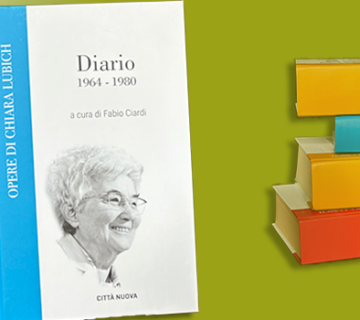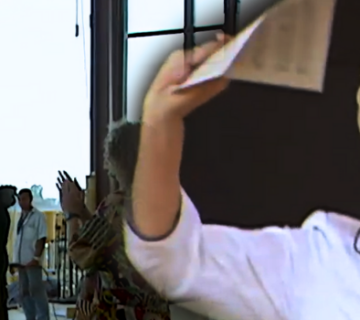 “It is suggestive that a city which recognizes a woman of such deep faith as Chiara Lubich, as a symbol of peace, finds itself ten years later with an administration of such diverse political leanings taking up her legacy.” With these words Archbishop Salvatore Visco welcomed the people who had gathered at the Garibaldi Theatre in Santa Maria Capua Vetere for a conference entitled Chiara Lubich, Woman of Dialogue.
“It is suggestive that a city which recognizes a woman of such deep faith as Chiara Lubich, as a symbol of peace, finds itself ten years later with an administration of such diverse political leanings taking up her legacy.” With these words Archbishop Salvatore Visco welcomed the people who had gathered at the Garibaldi Theatre in Santa Maria Capua Vetere for a conference entitled Chiara Lubich, Woman of Dialogue.
“You can change the world beginning from your own city, because the facts that you have recounted here demonstrate the change that has taken place in many of you,” said Focolare president Maria Voce as she addressed the young people regarding their concrete commitment against illegality and other social ills; for their efforts in favour of the environment; for becoming directly involved in improving their cities. “This is not an abstract dialogue among people or religions,” Maria Voce pointed out, “but a lifestyle of dialogue; not an activity, but a way of being that needs to be nourished by love, mercy and an ability to forgive: because we are all brothers and sisters and children of the same God.”
A very keen reflection was given by philosopher Aldo Masullo who defined dialogue as: “the way for overcoming the desperation of solitude, for war is born of desperation; whereas peace is founded on faith that is rooted in authenticity.”
Nasser Hidouri, Imam of the Mosque in the municipality of San Marcellino, testified to the life that comes from “not fearing our differences” and from “not being conditioned by the problems that are created by a violent minority,” mindful that “the questions that remain unanswered for us today, will be inherited by our children tomorrow.”
Alberta Levi Temin of Jewish-Christian Friendship and survivor of the Nazi round-up in the ghetto of Rome when she was a child shared her vision of humanity: “a pyramid with three sides at its base comprised of religions, peoples and cultures all leading to the top where God is equally distant from each one of them.”
Then there was the testimonial of Antonio Casale, Director of the Centro Fernandes [Fernandes Centre] for welcoming immigrants, especially from the African Sub-Sahara: “More important than the beds, meals or medicine we provide is the human dignity that we try to restore to each individual.”
In the problematic economic and social situation of the region, the voice of anti-racket entrepreneur Antonio Diana, whose father had been murdered by the Camorra, had a positive message: “You can do business without adapting to the customs of corruption and without falling into compromise,” being willing to pay the price.
An evening event that showed the fruits of 360° dialogue helped to convey hope to the participants for a better future that is based on what each one accomplishes in the present.
On November 24, 2013, two thousand people from Focolare communities gathered in Naples. They came from Campania, Puglia and Basilicata, with some people from Albania. First there were some opening words from the Mayor of Naples, Luigi de Magistris. Then there was an open dialogue with Maria Voce and co-president Giancarlo Falleti. Some of the topics of discussion included: involvement in politics and civil life; making decisions in crucial moments when you are young; launching and prospective for the Movement as it reaches out in service to humanity and in contributing to the fulfillment of Jesus’ prayer: that all may be one.
On November 25, 2013, Maria Voce presented the keynote address on Jesus Forsaken, A Light for Theology for the opening of the academic year at the St. Robert Bellarmine Institute of Religious Sciences. Bishops from several diocese of Campania also attended.


 Italiano
Italiano Español
Español Français
Français Português
Português



No comment